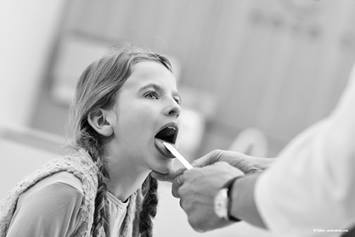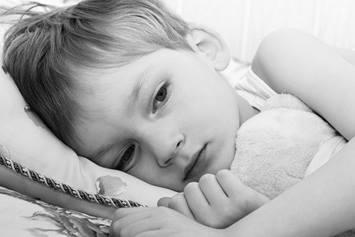Upper Respiratory Infections (Colds)
What Is an Upper Respiratory Infection?
The common cold is a respiratory infection caused by a virus (germ). Rhinoviruses are the most common cause.
Viruses are spread by breathing in air droplets of the infected person who coughs, sneezes or even laughs less than 6 feet from your child. The virus can also be spread by touching something that the infected person has sneezed, coughed or drooled on.
A cold affects the nose and throat. Symptoms usually start slowly and include:
- Runny or stuffy nose
- Sneezing
- Cough
- Sore throat
It may take 3 to 14 days for your child to get well. Usually, your child can do all of their normal activities.
How Are Upper Respiratory Infections Treated?
- Since the common cold is a virus, antibiotics will not help.
- Have your child drink plenty of fluids, such as water, chicken broth or popsicles (Picture 1). Give small amounts of liquid often. Limit fruit juice so that your child does not develop diarrhea.
- Do not force your child to eat. They will eat when hungry.
- Your child should get plenty of rest.
- For a stuffy nose:
- Use a saline nasal spray and a bulb syringe to help congestion before eating or sleeping.
- You can put moisture into the air with a cool mist vaporizer or humidifier. Do not put medicine in the vaporizer. Change the water in it every day and clean it between uses.
- If you do not have a vaporizer or humidifier, run hot water in the shower for 10 to 15 minutes (Picture 2). Keep the door closed and stay with your child while they breathe in the moist air. Be careful to keep them away from the hot water.
- To prevent or treat skin irritation around the nose and on the lips, apply petroleum jelly (Vaseline®) or an unscented cream, such as Eucerin®, Cetaphil® or Aquaphor®.
- For a sore throat:
- Sip herbal tea or warm lemon water mixed with 1 to 2 teaspoons of honey. Honey works well for coughs, too. It is not safe to give honey to children younger than age 1.
- Sometimes it is soothing to sip ice cold drinks.
- Older children can suck on cough drops or hard candy or gargle with warm salt water (¼ to ½ teaspoon of table salt dissolved in 8 ounces of warm water).
- For a sore throat, aches and pains or to help bring down a fever, you may give:
- ibuprofen (Children's or Infant's Motrin®, Advil®) to children over 6 months
- acetaminophen (Children's or Infant's Tylenol®) to children over 2 months.
- Do not give aspirin or products that contain aspirin to children (Picture 3).
- Avoid over-the-counter (OTC) cold and cough medicines. They are not effective and not recommended. They should not be given to children younger than 4 years of age.
- For ages 4 to 6, ask your child’s health care provider which OTCs are safe. Do not give OTCs unless first OK’d.
- Never give your child medicine for adults.
How Do You Protect Your Child and Others From the Common Cold?
- Good hand washing is VERY important! Clean your hands and your child’s hands often with soap and water. Wash for 15 to 20 seconds or the time it takes to sing the Happy Birthday song. If soap and water are not available, an alcohol-based hand sanitizer that contains at least 60% alcohol may be used. Rub hands until dry.
- Teach your child to avoid touching their eyes, nose and mouth whenever possible.
- Teach your child to cover their nose and mouth with a tissue when coughing or sneezing, or to cough into their shirt sleeve. Wash hands afterwards.
- Keep a trash can nearby or a paper bag taped to the bed or couch for throwing out used tissues.
- Wash the sick child's drinking glasses, knives, forks, or spoons with hot soapy water. Do not let other family members use them.
- Other children should not play with or sleep in the same bed with your sick child during the early stage of the cold.
Fever
Children with a cold often do not have a fever. If your child has a fever under 100.4º F, they do not need to be treated unless they have other symptoms. Fever is the body’s way of fighting infection.
- Check your child’s temperature using a digital thermometer. Never use a mercury thermometer. Wash the thermometer thoroughly after each use.
- Use only a rectal (in baby’s bottom) thermometer in infants under 3 months of age.
- For infants 4 months of age or older, take rectal, ear or axillary (armpit) temperatures.
- When your child reaches 4 years of age, oral (mouth) temperatures are OK.
- A fever is:
- For age 3 months or younger, a temperature of 100.4º F (38º C) or higher.
- Older than 3 months, a temperature over 102º F (38.9º C) or your child looks very sick to you.
When to Call the Health Care Provider
Call the health care provider if your child has any of these symptoms:
- Cough is brassy, high-pitched or has a barking sound
- Fever does not come down or go away after treatment
- Sickness lasts more than 10 days or worsens after improving
- Complains of ear pain, pulls at their ears or rolls their head from side to side
- Has difficulty swallowing or refuses to take liquids for 4 hours or more
- Does not feel like playing or does not act right
Call 911 if your child:
- Has trouble breathing
- Is gasping, wheezing or grunting
- Skin color changes to grayish blue or is very pale
Helping Hands Patient Education Materials
Written and illustrated by medical, nursing and allied health professionals at Nationwide Children's Hospital, Helping Hand instructions are intended as a supplement to verbal instructions provided by a medical professional. The information is periodically reviewed and revised to reflect our current practice. However, Nationwide Children's Hospital is not responsible for any consequences resulting from the use or misuse of the information in the Helping Hands.
HH-I-30 Revised 2020 | Copyright 2009, Nationwide Children’s Hospital



